New ideas in mathematical study profoundly impact people’s thinking. While challenging long-held views maintained for a long time, it gives a unique insight. Qiang Wang’s “Principle of Large Number Domain” is a revolutionary approach to mathematics that seeks to modify and explain infinity. The book addresses enormous numbers and the domains they cover in detail.
Wang’s theory explores the mathematical universe to the fullest. This theory seeks the brilliant and eternal natural laws hidden in the large number domain’s mysterious space. These laws resemble Kepler, Einstein, and other vital constants.
Wang’s theory’s study of cardinality and infinity is crucial. Wang’s research shows that the fraction set has a much higher cardinality than the integer set, contrary to Cantor’s theory of infinity. Wang’s theory also rejects that a part can match the whole. Instead, it states that the whole is always more significant than the parts.
The “Principle of Large Number Domain” goes beyond abstract concepts. Instead, it requires profound observation, abstract reasoning, and math skills. This combination creates a new synergy. Dimension, thinking, and computing power create unmatched insight.
Science’s fundamental principles, logic, evidence, and the pursuit of objective truth—power Wang’s theory. It shows how strong these ideas are. Wang disproves Cantor’s claims using rigorous philosophical speculation, careful mathematical reasoning, and years of data-driven computational analysis. This indicates that the fraction domain has a higher cardinality than the integer domain and that the whole is always more significant than the sum of its parts.
The ability of science to survive scrutiny in an age of skepticism and fleeting fashions is one of its many admirable qualities. The validity of Wang’s theory has been investigated by utilizing superfast computers, philosophical debates, and logical reasoning. The most important takeaway from this laborious investigation is the realization that Cantor’s theory of infinity has basic errors.
However, Wang’s work goes beyond mathematics. It shows how all scientific fields are connected, and mathematics underpins modern society. Math has advanced civilization throughout history. Mathematicians have moved humanity from Euclid to Gauss.
The “Principle of Large Number Domain” affects more than math. Instead, they’re everywhere in science. Wang made surprising claims that could change our understanding of physics, chemistry, cosmology, and quantum mechanics. Wang wants collaboration to uncover more profound truths. He breaks the rules and then asks global experts to verify his theory.
In a world full of transient fads, Wang’s idea assists us in comprehending what is genuinely significant. It adheres to the rules of nature, which cannot be altered, is rational, and is supported by facts. As a result, it extends an invitation to work with those in the scientific, mathematical, and thinking communities. If we are willing to acknowledge the “Principle of Large Number Domain,” we can move closer to finding answers to the riddles of the cosmos. By doing this, we can progress in science, society, and humanity.
